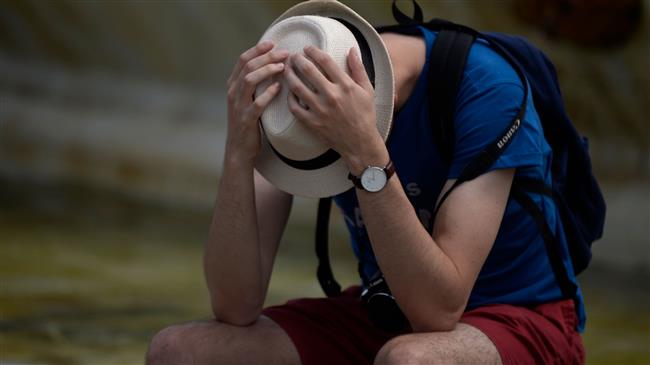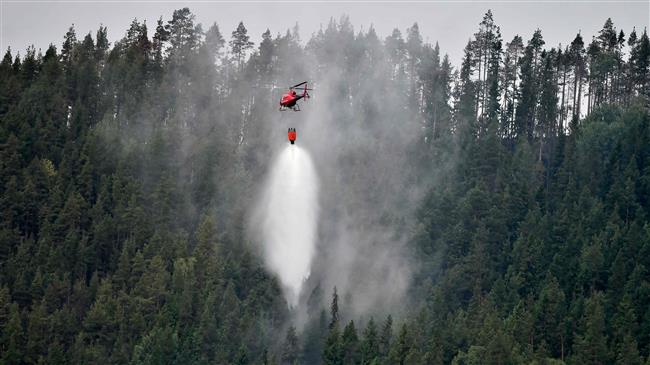Europe copes with record heat wave, 2 die in Spain
Two men have died from heatstroke in Spain as Europeans cope with a record heat wave.
Hot air from North Africa has caused the most severe heat wave since 2003.
The heat wave has brought drought and forest fires in areas as far apart as Britain and Greece.
Temperatures hit a scorching 45 degrees Celsius in some areas on the continent on Friday.
Weather forecasters predicted temperatures in Spain and Portugal could rise to 2 or 3 degrees higher.
Parts of Portugal's parched southern region of Alentejo were forecast to hit 47 degrees. The country is on alert to prevent a repeat of its worst fires in history last year, when 114 people died. Portugal's Civil Protection agency reported 426 firefighters were putting out or checking fire alerts in the north and center. Fires typically flare late in the day when the weather is hottest.

In Spain, two men, a roadworker in his 40s and a 78-year-old pensioner, died from heatstroke this week in the southeastern region of Murcia.
In Germany, state rail operator Deutsche Bahn said it was offering free water to passengers in case of delays and would keep air conditioning running on its trains even when they are empty.
In the Italian capital, Rome, already well-equipped with free drinking water fountains, authorities are handing out bottles of water to tourists.

The national farmers' union, Coldiretti, said that milk production was down 15 percent as cows suffered from the heat. At the same time, ice cream consumption was up 30 percent over the past week, the union said.
In France, huge swathes of the country have been placed on heat wave alert with the health ministry rolling out a TV and radio campaign alerting people to the dangers of what is expected to be the most intense heat wave since 2006.
However, national weather service Meteo France said conditions were not as severe as in August 2003, when several days of scorching heat caused more than 11,000 deaths.
Meanwhile, tourists took shelter under umbrellas outside the Louvre Museum in Paris and ignored 'No Bathing' signs to paddle in the fountains.
"We're here for two days, so we're going for it," said David Jones from England, cooling off by the fountains with his wife.
Martina Ihrig, an office worker from Germany, said she was delaying visiting the Eiffel Tower with her three daughters until evening.
"It's too hot to visit it now," she said.
Tourism operators, such as Thomas Cook and Alltours, were quoted by German news agency DPA as saying that last-minute bookings for the Mediterranean are down, as holidaymakers seek out cooler temperatures on the North Sea and Baltic coastlines.
In Switzerland, mountain railways reported booming business as city dwellers fled to the Alps. Fishery authorities in the canton of Zurich were combing creeks to rescue fish from suffocation as streams dry up or oxygen levels plunge.
The Budakeszi game reserve outside the Hungarian capital Budapest and La Fleche zoo in northwestern France said they were helping the animals cope with heat by treating them to iced fruit and a diet with less meat and more nutrients.

In Sweden, the country experienced its hottest July in more than 250 years. A glacier on Sweden's Kebnekaise mountain has melted so much that it is no longer the country's highest point, raising concerns about the rapid pace of climate change.
Authorities warned against swimming due to a bloom of toxic algae spreading caused by hot weather.
Polish police said nearly 250 people had drowned since the beginning of April, including 75 in July alone.
The Belgian road safety authority VIAS reported an increase in the number of road accidents as a result of the heat wave.
"The daily average number of accidents is 15 percent higher during a heat wave. And the accidents are more serious," VIAS spokesman, Stef Willems, was quoted by Belgian media as saying.
The highest temperature ever recorded in Europe was 48 degrees in Athens in 1977.
Columbia, Yale students bent on ending US support for Israeli genocide
VIDEO | Genocide in Gaza
Iran calls on BRICS to play role in stopping Israeli crimes
President Raeisi’s historic visit opens new chapter in Iran-Pakistan ties
Russia: Poland’s talks on hosting US nuclear weapons ‘dangerous’
VIDEO | Israel’s genocide bounty
India’s home minister vows to end Muslim reservation if his party wins
UN expert calls for arms, oil embargo against Israel













 This makes it easy to access the Press TV website
This makes it easy to access the Press TV website